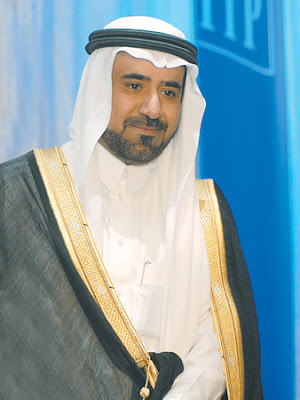
Al Waleed Bin Talal (born 7 March 1955) is a Saudi Arabian businessman and investor. He is a member of the Saudi royal family.
He is the founder, CEO, and 95%-owner of the Kingdom Holding Company. Arabian Business ranked him as the most influential Arab in the world. Forbes listed Talal as the 26th-richest man in the world, with an estimated net worth of US $20 Billion.
Al Waleed began his business career in 1979 upon graduation from Menlo College. His activities as an investor came to prominence when he bought a substantial tranche of shares in Citicorp in the 1990s when that firm was in crisis. With an initial investment of $550 million ($2.98 a share after adjusting for stock splits, acquisitions, and spin-offs, according to Bloomberg calculations) to bail out Citibank caused by underperforming American real estate loans and Latin American businesses, his holdings in Citigroup now comprise about $1 billion.
In 1997, Time Magazine reported that Al Waleed owned about 5 percent of News Corporation. In 2010, Alwaleed's stake in News Corp. was about 7% worth $3Bn; and News Corp. had a $70 million (9%) investment in Al Waleed's Rotana Group, the Arab world's largest entertainment company. This review of his holdings also referred to the Al Waleed investment AOL as if it was perhaps in the past.
His stake in Citibank once accounted for approximately half of his wealth, prior to the financial crisis of 2007–2010. At the end of 1990, he bought 4.9 percent of Citicorp’s existing common shares for $207 million ($12.46 per share)—the most that he could without being legally obliged to declare his interest. In February 1991, he spent $590m buying new preferred shares, convertible into common shares at $16 each. This amounted to a further 10% of Citicorp and took his stake to 14.9%.
In 1999, The Economist expressed doubts about the source of income of Prince Al Waleed and whether he is a front man for other Saudi investors. Because his income in the 1990s was insufficient to cover his expenditures. "You could barely clothe a Saudi prince for such sums, let alone furnish him with a multi-billion-dollar empire. Nevertheless, by 1991 Prince Alwaleed had felt able to risk an investment of $797m in Citicorp", wrote the magazine.
Later, he also made large investments in AOL, Apple Inc., MCI Inc., Motorola, Fox News, and other technology and media companies.[14] Al Waleed's stake in Apple was sold in 2005.
Al Waleed also invested in Eastman Kodak and the airline TWA, these investments have both performed poorly.His real estate holdings have included large stakes in the Four Seasons hotel chain and the Plaza Hotel in New York. He sold half of his shares in the latter in August 2004. He has made investments in London's Savoy Hotel and Monaco's Monte Carlo Grand Hotel. He currently holds a 10% stake in Euro Disney SCA, the company that owns, manages, and maintains Disneyland Paris in Marne-la-Vallee.
In January 2005, Al Waleed purchased the Savoy Hotel in London for an estimated GBP £250 million, to be managed by Fairmont Hotels and Resorts; his sister, Sultana Nurul owns an estimated 16% stake. In January 2006, in partnership with the U.S. real estate firm Colony Capital, Kingdom Holding acquired Toronto, CA-based Fairmont Hotels and Resorts for an estimated $3.9 billion. In 2009, it was reported that Al Waleed owned 35% of Saudi Research and Marketing Group (SRMG), reportedly the largest media company in the Middle East.
In August 2011, Al Waleed announced that his company had contracted Saudi Binladen Group to build the next tallest building in the World, the Kingdom Tower at a height of at least 1,000 metres (3,300 ft) for SR 4.6 billion. The original plan announced in 2008 called it برج الميل (Arabic for "the Tower of One Mile") at 1,609 metres (5,279 ft) and an estimated cost of US$10 billion.[citation needed]
In December 2011, Al Waleed invested $300 Million in Twitter through the purchase of secondary shares from insiders. The purchase gave Kingdom Holding a "more than 3% share" of the company, which was valued at $8Bn in late summer 2011.
 Saleh Kamel is the founder and chairman of Dallah Albaraka, a conglomerate with interests in Islamic banking, real estate development and food production. Kamel took subsidiary Dallah Health public in December 2012, keeping a 52% stake.
Saleh Kamel is the founder and chairman of Dallah Albaraka, a conglomerate with interests in Islamic banking, real estate development and food production. Kamel took subsidiary Dallah Health public in December 2012, keeping a 52% stake.



